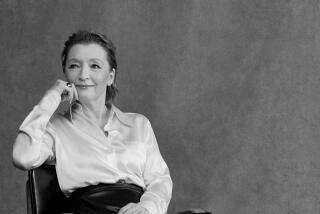Helena Bonham Carter finds her role in ‘Alice in Wonderland’ is a royal pain
- Share via
When Tim Burton finally made his surprise proposal, Helena Bonham Carter was touched by how shy and befuddled he sounded. “He was so polite about it, and there were so many hesitations,” Bonham Carter said. “He said, ‘Would you consider, um, possibly, perhaps -- but only if you want to -- um, anyway, would you play the Red Queen?’ ”
Bonham Carter, who has a nine-year romance and two children with Burton, giggled as she recounted the moment when she was invited to take on the royal role in “Alice in Wonderland,” the highly anticipated Disney film opening Friday.
“It was like a proposal of marriage,” said the 43-year-old actress.
“I was doing ‘Terminator Salvation’ at the time, and when he asked me, I was really flattered. It was a complete surprise! I know people think it’s disingenuous when I say that, but it’s true. They won’t understand this, but each time [he has a film], I truly don’t expect Tim to ever want to work with me again.”
It will be 25 years ago this December that Bonham Carter had her career breakthrough in the role of Lucy Honeychurch in “A Room With a View,” and she has put together an eclectic list of credits since, many of them with Burton -- “Alice” is the sixth since 2001, and in that span she has been a talking simian (“Planet of the Apes”), a moldering, undead woman (“Corpse Bride”) and, now, in “Wonderland,” a shrill queen with an abnormally swollen skull.
“I personally find it especially flattering that he tends to deform me in every movie,” Bonham Carter said. “But my mother and everyone ask me, ‘What is it with you and him?’ But that’s the point of acting isn’t it? It’s all dress-up.”
This time, the dress-up adventure is a surreal jaunt through Wonderland, in which Johnny Depp is the Mad Hatter, newcomer Mia Wasikowska handles the title role, and a deep roster of British actors (among them Alan Rickman, Michael Sheen and Stephen Fry) give voice to the unsettling animal kingdom on the other side of the rabbit hole.
No one has more memorable scenes, though, than Bonham Carter, whose role is a heady one, to say the least. A special camera and digital wizardry were used to magnify the star’s head, and the effect is a bit jolting to watch. In the plot, the queen’s monstrous noggin makes her a freak even by Wonderland’s standards.
For the record, Burton didn’t mention the major-league melon when he made his sweet proposal. “I learned that when I read it in the script,” Bonham Carter said with mock distress. “Oh, a huge head? I see, lovely.”
The film is a mix of live-action performance, green-screen motion-capture work and pure animation, which made for a dizzying amount of computation, crisis control and collaboration from Burton’s team. On the set, for instance, someone had to keep track of where the Red Queen’s mega-cranium would be in relation to doorways, furniture and other actors.
“The queen’s head was something we had to be careful to account for all the time,” visual-effects supervisor Ken Ralston said. “We had to remind people to back away from Helena in their scenes to give her head enough room.”
Burton said the key to the Red Queen was to make sure that she wasn’t entirely evil or predictable and that her rivalry with her normal-headed sister, the White Queen (played by Anne Hathaway), would draw in the audience.
Linda Woolverton, the screenwriter for “Alice,” says the Red Queen grew up with a tumor in her head, which, in Wonderland’s version of physiology, made her head vast. “Linda told me it also made the queen emotionally volatile and arrested in her development,” Bonham Carter said with something close to sympathy. “We have a 2-year-old daughter, Nell. There are some similarities.”
Bonham Carter says some moviegoers will be surprised to learn that this new film is more like a sequel to Lewis Carroll’s familiar tales of Alice than a remake of, say, the 1951 Disney version.
“It’s all very invented, very new with this film and with good reason. The original Carroll stories are in fact very episodic -- there isn’t a lot of huge narrative or dramatic drive. The story that Linda Woolverton invented is a mixture, it’s stolen from both [books by Carroll] but given a real context and a story and a purpose for the whole dream to occur.”
More to Read
Only good movies
Get the Indie Focus newsletter, Mark Olsen's weekly guide to the world of cinema.
You may occasionally receive promotional content from the Los Angeles Times.










